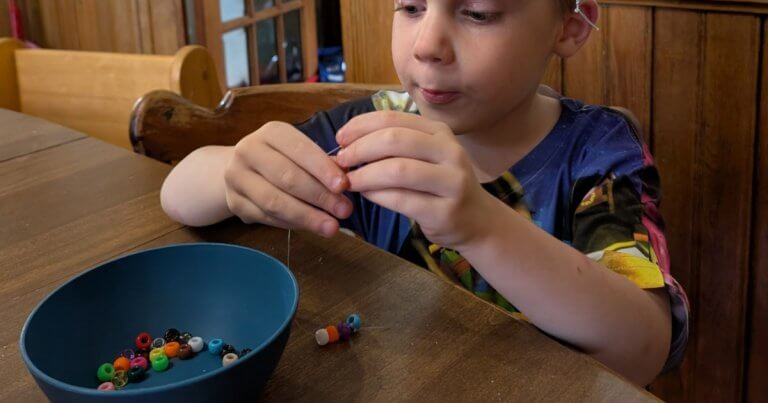I often revisit this scene from a Joyce Carol Oates novel: a child and her caregiver, the adult mumbling, “you’re so…” trailing into a wrought silence. The child internally responds, “but what am I?…I don’t know, tell me.”
The recollection of that vulnerability, and the years in which it is keenest (middle elementary school to young teenager), was a gut-punch.
But it do be like that, right?
I remember those hazy and vaguely anxious years, gathering “facts” about myself, not all good. Some were justifiable, born from failure and/or negative behavior. Some came from the careless remarks or cruel insults from others. Those are hard to shake.
I hope to help our kids through those years, reminding them of their unique strengths early and often. That way, when someone asks them (with words or action), “who do you think you are,” they’ll have ready, laudatory answers.

Recognizing All Kinds of Strength and Skills
Some skills are easier to spot than others. There are the big and splashy ones, like, “he just started singing The Music Man one day!” or “we taught her skip counting; next thing we know, she’s doing times tables!”
Some aren’t. These strengths are quieter, if you will. They could be anything from having empathy to a great sense of style.
There are all kinds of skills: creative, inter-personal, organizational, emotional, self-regulation, and more. Let’s explore and identify spectrums of strength.
Gather Data
Compile a quick and dirty list of your child’s obvious strengths, listed on paper/notes app or just in your head.
Think about times when other adults (family members, teachers, librarians, friends, etc) mentioned your child’s unique strengths. What did they say?
Any skills you swear the kid was born with? Ones strongly apparent by toddlerhood? Those are the big and flashy strengths. Note them.

Brainstorm
The less obvious skills need ferreted out.
Think about different skills: having good balance, working well in groups, the ability to regulate emotions, or memorization feats. Mentally explore the many spheres of skills: athleticism, social, reasoning, artistic, or task expertise.
These observations warrant a quick jot into the notes app, lest forgotten. Refer to and update this list often.
Pay Attention
It will be harder to find and register subtle skills, requiring pointed and purposeful attention. And what I’m going to say about that sounds harsh.
Please understand that I am speaking to myself as much as anyone else (and imagine me kissing you on the forehead as I say it): it’s harder to pay attention when sleepy, or irritated, or distracted. Therefore, for this to work, our cups must be full (and present).
We need to fill in that first level of Maslow’s Hierarchy of Needs (whether it be by practicing stress management, getting enough vitamins and minerals, sleeping better, etc.) and keep our eyes (and hands) off the smart phone.

Reframe Behavior
Now that the strengths are enumerated, are there any…medium behaviors? Not catastrophic, but not great behaviors, ones that can be annoying in the moment.
Can any of those behaviors be reframed with a strength format?
Here’s a personal example: our almost five year old asks questions (including asking if he can ask a question), constantly. It doesn’t matter whether you’re vibing, driving a van, doing the dishes, or wrangling a mongoose.
This can be cute, annoying, and incredibly inconvenient. Under duress, it’s easy for me to snap, “not now, A3!”
But when I’m paying attention, and in a reframing state of mind, I can (more) calmly say: “you’re so curious, A3! I can’t answer now but I’ll tell you when I can.”
But Don’t Lie About It
Don’t tell me how “strong-willed” Bayleigh is while dodging projectiles.
She’s strong-willed when she perseveres in problem solving. Or when insisting “me do it!” Right now, she is out of control. We’re gonna call a spade a spade.
And it’s ok to say that! In a brief, age-appropriate way: “Oh man, you want to be in charge so much! You are angry and lashing out.”
Truthfully, this is more for our benefit than theirs; to remind us that behavior is communication, temporary, and doesn’t occur in a vacuum. Say it enough and adults and children both absorb that message.

Conclusion
Just so you know, these activities (listing flashy and subtle skills, reframing honestly, even charting) are great for adults, too. I’ve made lists for myself (and Josh) and I reframe all day.
It helps. Try it out!
Want More?
Need more positive parenting content? Check out these articles:
- The Third Best Parenting Tip I’ve Ever Received: Emotional Validation
- 50 Acts of Kindness for Kids of All Ages
- Non-reactive vs. Gentle Parenting
Happy positive conditioning!
Love,





